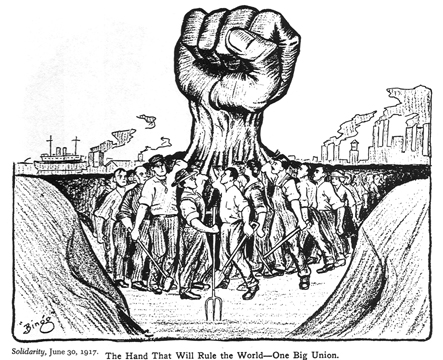In Burns v. United States, 274 U.S. 328 (1927) — a companion case with Fiske v. Kansas and Whitney v. California — the Supreme Court upheld the California Syndicalism Act and upheld the conviction of a member of the Industrial Workers of the World (IWW).
Burns was found guilty of syndicalism law for his membership in IWW
Burns was found guilty of the California Syndicalism Act in 1923 based on his membership in the IWW, a labor union with ties to socialist and anarchist movements. Although there was no question that Burns was an IWW member, he took issue with the jury instructions that found IWW to be an illegal organization.
Burns said jury instructions incorrectly defined sabotage
The jury instructions said that IWW often advocated slowing down work to harm employers. For example, members of IWW were encouraged to load ships incorrectly so that they would have to return to port to be reloaded, thus harming the employers. The judge said that slowing down work or reducing profits in such a way constituted sabotage.
California defined sabotage as willful and malicious physical damage or injury to physical property. Burns argued that the judge’s example did not constitute sabotage under the law’s definition.
Court said jury instructions were correct when taken in context; upheld conviction
In the majority opinion, Justice Pierce Butler relied on Whitney to dismiss charges that the law was “void for uncertainty” and then proceeded to review the instructions to the jury in Burns’s trial.
Acknowledging that the judge’s instructions had included job slowdowns in his description of sabotage, Butler noted that these words were not intended to have been taken alone, but in the context of other instructions. The judge had read the jury multiple definitions of sabotage. The Court also found there was sufficient evidence in IWW literature to see that IWW had advocated other acts of sabotage, such as killing plants, starting fires, and damaging materials. The Court therefore upheld Burns’ conviction.
Butler dismissed objections to another part of the judge’s instructions to the jury on the basis that the matter had not been properly raised in the lower courts.
Justice Louis D. Brandeis authored a dissent that rested not on constitutional grounds, but on the basis that the jury instructions had improperly described slowing down at work as one aspect of sabotage and that such faulty instructions should be considered “presumptively prejudicial” rather than dismissed as harmless errors.
Court eventually overturned such syndicalism laws
In Brandenburg v. Ohio (1969), the Court eventually overturned laws like the one at issue in Burns on the ground that they punished speech that did not create a threat of imminent lawless action.
John Vile is professor of political science and dean of the Honors College at Middle Tennessee State University. He is co-editor of the Encyclopedia of the First Amendment. This article was originally published in 2009. It was updated by Encyclopedia staff in October 2019.

